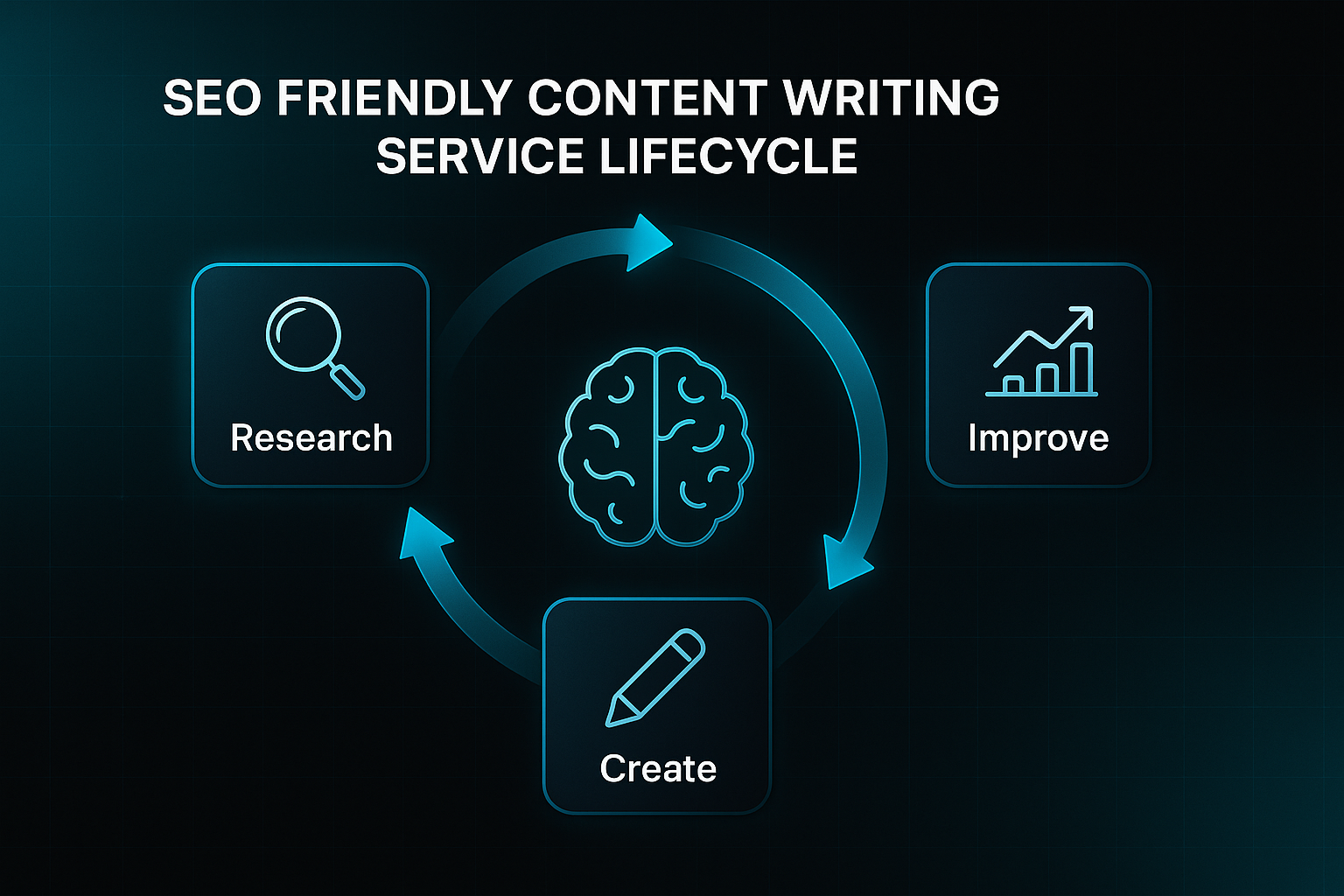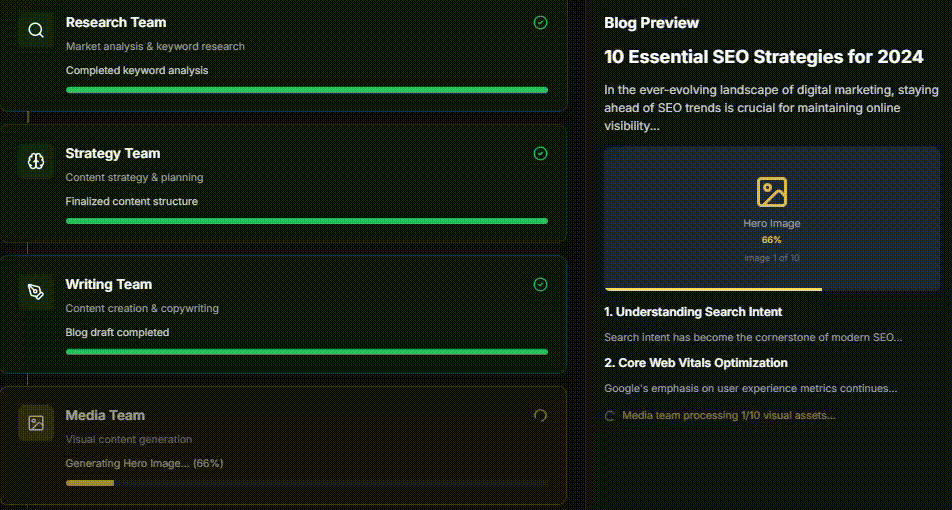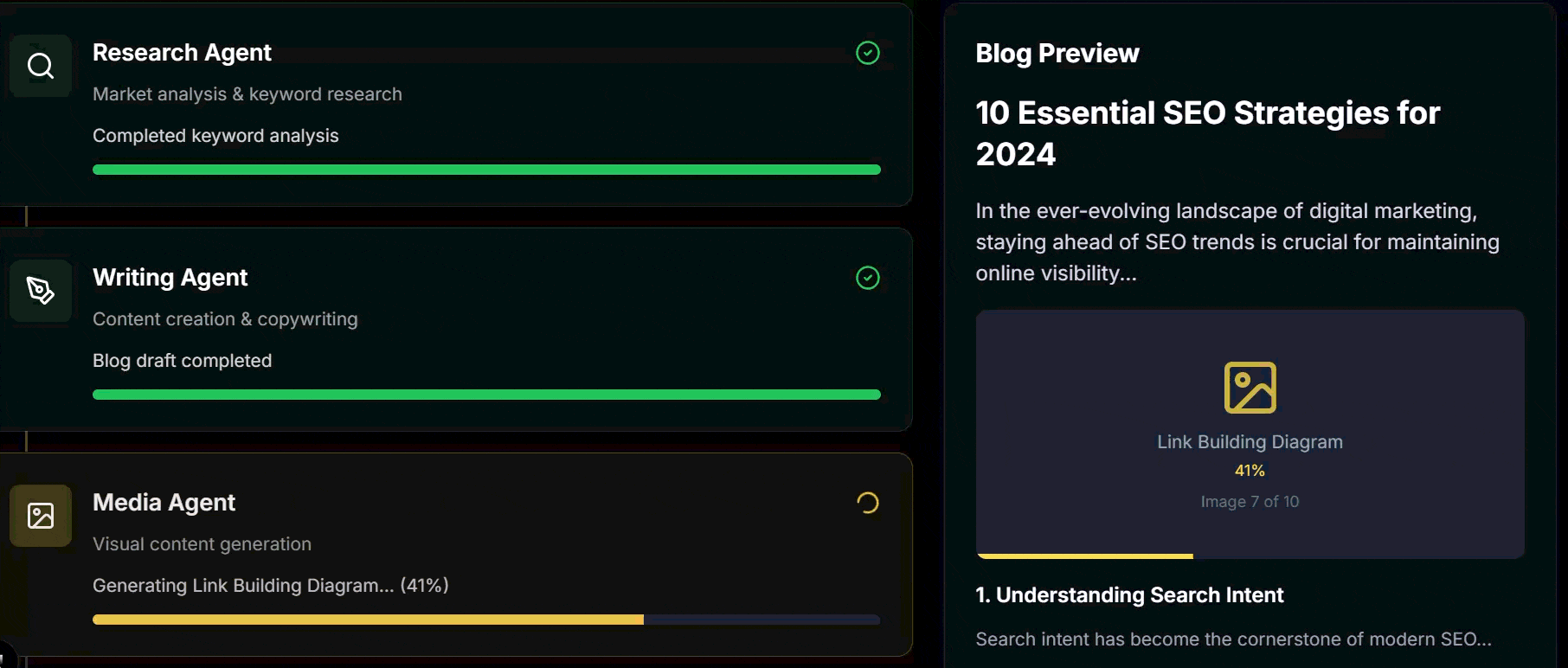Finding a content writing service that actually delivers SEO results can feel overwhelming. Many businesses end up with generic articles that don’t move the needle on rankings or conversions.
I’ve seen how the right provider goes far beyond basic copywriting. They combine deep keyword research, smart technical optimisation, and ongoing performance tracking—all tailored to your goals and brand voice.
In this article, I’ll break down exactly what sets true SEO-friendly content services apart. You’ll see which content types they cover, the core components that matter, and how to spot red flags before you commit.
By the end, you’ll know how to evaluate providers, avoid common pitfalls, and choose the best model for your business—whether that’s an agency, freelancer, or platform. Let’s get practical about what really works.
What are SEO friendly content writing services?
Defining SEO friendly content writing services
SEO friendly content writing services aren’t just about throwing words onto a website and hoping for the best. Their real focus is optimising content for search engines so businesses get seen. But what makes them different from the average copywriting service?
It starts with advanced SEO strategies at every step. Providers dig deep with keyword research, finding terms people genuinely use and matching their intent. Competitor analysis is routine, showcasing what rivals do well—and where your brand can stand out.

What is SEO writing? | SEO Content Writing Tutorial
The process goes beyond technical tweaks. Content always aligns with your wider marketing plan, and your brand’s voice stays clear and consistent. Each piece begins with a custom brief, guided by real research.
Structuring matters, too. Headings aren’t just helpful for readers; they make it easier for search engines to understand your content. Meta data and schema markup help behind the scenes. And keywords? They’re integrated naturally and smartly, which builds authority and trust with every paragraph.
Instead of unnaturally stuffing keywords into your content, focus on creating valuable, informative, and engaging articles that naturally incorporate relevant terms and phrases.
After publishing, providers don’t just move on. They track rankings, traffic, and conversions so your site adapts as trends and goals evolve. Content is never static—it keeps pace with your business.

Types of content covered by these services
- Blogs
Capture long-tail searches and establish authority through ongoing SEO-optimised articles. - Landing Pages
Attract high-intent users and drive conversions with targeted optimisation. - Product Descriptions
Elevate e-commerce visibility by focusing on keyword-rich writing. - Pillar Pages
Explore broad topics deeply to position your brand as a topical expert. - How-to Guides and Tutorials
Answer user questions and showcase practical expertise. - Listicles and Gallery Content
Draw shares and win snippets with engaging lists or galleries. - FAQ and Informational Resources
Pull in targeted traffic by solving common queries. - Branded/Thought Leadership Content
Strengthen industry credibility with search-optimised insights.
Every format is crafted for search performance and tailored to your goals.
Core components of an SEO content service
Great providers deliver through three key pillars.

Content strategy and research
It all begins with detailed keyword research, competitor and market analysis, and editorial planning. This is where new opportunities emerge.

Semrush Tutorial for SEO Content Writing: Win the Google Game
Professional SEO writing and optimisation
Writers use custom briefs, structure headings, weave in keywords naturally, optimise meta data, and build internal links. Schema markup is added if relevant.
Performance measurement and improvement
Rankings, site visits, and conversions are tracked. Providers share reports on KPIs and ROI and refresh content to keep your business ahead.
This end-to-end approach—focused strategy, expert writing, and ongoing refinement—is what delivers genuine search success.
Key elements of SEO optimised content provided by services
Let’s talk honestly: getting your site to rank isn’t just about writing a great article. The best SEO writing services bring together smart technical optimisation, strategic thinking, and ongoing tweaks—all focused on boosting your rankings and helping you reach real people. Knowing these core ingredients helps you spot strong providers and set the right expectations straight away.
Strategic keyword selection and integration
Ever notice how certain websites seem to finish your sentences? That’s because top providers use advanced research tools to dig up keywords that real users actually type.
They’ll analyse your competitors too, looking for keyword and topic gaps—the places where your rivals are grabbing all the search traffic. By working both broad “head terms” and ultra-targeted long-tail keywords into your titles, headings, and throughout your text, you reach a wider, more relevant audience. Bridging those gaps doesn’t just bring more visitors; it often means higher-quality enquiries as well.

Technical on-page SEO delivered by providers
But here’s where the technical magic happens. Leading providers do much more than write—they craft snappy meta titles, create descriptions that stand out, and add schema markup to help you shine in search results.
Organising your content with clear H1, H2, and H3 headings makes content easy to follow for both humans and search engines. And strategic internal linking helps build authority across your site while guiding users where you want them to go. Strong technical groundwork can quickly mean better indexation and ranking gains for your target keywords.
Content structuring for user engagement and SEO
Now, let’s look at structure. Readable content—built with subheadings, concise bullet lists, and brief paragraphs—makes life easier for users and engines alike.
Providers slot in calls-to-action and visuals right when users need them. Tailoring your content to match the stages of the buyer journey adds trust and relevance, often increasing engagement and conversions.

Continuous content improvement
Here’s the secret sauce: ongoing improvement. Premier providers don’t hit publish and walk away. They refresh older pieces with new keyword insight, sharper layouts, and smarter linking in line with ever-changing ranking signals.

This continual cycle means you keep up with competitors, ensuring your organic traffic and conversions keep growing—or at the very least, never slip backwards.

AI-Powered Content Strategy
See the AI platform that's replacing entire content teams (with better results).

Benefits of outsourcing SEO content writing services
Scalability and flexibility for growing businesses
How do some businesses suddenly ramp up their content output without breaking a sweat? Outsourcing SEO content makes this possible.
If demand spikes because of a campaign launch or seasonal rush, agencies can boost production at short notice. In-house teams often struggle with bandwidth or delays in hiring. The real advantage comes when market priorities shift—an agency can quickly redirect writers and topics so your campaigns keep momentum.
This flexibility means you’re never stalled by internal capacity limits. You’re free to grab new opportunities and act fast when something important pops up.
Access to expert talent and proven SEO processes
Agencies pull together professional writers, editors, and strategists who specialise in your industry. Not only do you get technical accuracy, but the content delivers genuine authority and relevance.
Brand credibility is a crucial component of most marketing strategies, and the best case studies promote brand authority.
The whole process—from planning through to analytics—is managed, so all your SEO steps are expertly handled. When retailers make the switch, sector-expert writers can tweak product pages and content to match what shoppers search for, raising brand visibility.

Cost efficiency and operational focus
The budget benefits here are clear. Rather than building a full in-house team, you pay only for what you need—be it one-off projects or ongoing support. Agencies offer flexible plans, so you scale without overspending.
By outsourcing, your core staff aren’t bogged down in writing tasks. Instead, they focus on big-picture strategy, campaign planning, or other marketing priorities—no extra overheads burdening the team.
Enhanced business and marketing outcomes
So what does this deliver? With regular, optimised content, you keep climbing search rankings, attract more web traffic, and turn visitors into loyal customers.
Providers also refresh older posts, boosting domain authority and strengthening brand reputation over time. Many organisations see higher enquiry levels and greater credibility riding on consistent outsourced content.
Potential drawbacks and mitigation
Outsourcing isn’t always flawless. Sometimes there’s a risk of misaligned tone or brand voice.
Leading agencies rely on thorough onboarding and collaborative briefs. Regular catch-ups keep your message and goals aligned. Some companies keep sensitive content in-house while outsourcing high-volume work—a hybrid model often essential when regulations or tone are critical. This approach protects quality, authenticity, and efficiency.
Common pain points in finding quality SEO content writing services
Inconsistent or low-quality output
Ever received content that just feels generic or misses the point? It happens far too often to businesses searching for a reliable SEO partner.
The warning signs are pretty easy to spot—poor grammar, clumsy keyword placement, or writing that fails to connect with readers. When providers focus only on speed and volume, genuine expertise tends to slip through the cracks.
And if agencies lean too heavily on AI drafts without a human editor, you’ll often see shallow articles with missing facts that do nothing for your search rankings.
To avoid these headaches, always ask for up-to-date samples that show subject matter expertise. The best teams still edit and review every piece before it goes live.
Misaligned strategies and priorities
Why do agencies sometimes churn out loads of content and still miss the mark? Usually, strategy takes a back seat.
If no one’s discussing your business goals or unique audience, it’s no surprise when you get articles that fail to persuade—or even inform. You might get more visitors, but engagement and conversions remain flat.
So, make sure your provider tailors their work to your aims, not just a standard SEO template.
Workflow, communication, and scalability challenges
Ever had a project stall because instructions were unclear or deadlines kept slipping? That’s usually a sign of poor workflow and communication.
When your content needs ramp up, small problems quickly become major roadblocks without a solid process and dedicated contact. You want efficiency, but real human oversight still matters.
Transparency and reporting issues
It’s tough to trust a provider who’s vague about contracts or avoids sharing performance data.
If they dodge questions about who’s writing for you or fail to send proper SEO performance reports, it’s a warning to look elsewhere. Reliable partners explain their approach and keep you in the loop, so you can see exactly how their content supports your business.
How to evaluate SEO friendly content writing services
So, you’ve seen what can go wrong with SEO content providers—the missed targets, the muddled messaging. Now, it’s all about choosing wisely.

What’s the best way to sort the genuine experts from the rest? You need a structured approach. There are essential criteria to tick off, obvious warning signs to sidestep, and sharp questions to keep on hand during your search.
Criteria for evaluating services and agencies
The best SEO writing teams don’t just talk a good game—they’ve got results to prove it and processes they’re proud to share. When you’re comparing agencies, dig into each area with the following checklist. It helps make sure you’re picking someone who won’t let you down when it matters.
- Portfolio and case studies
Ask for fresh samples in your industry, and look for clear outcomes—did their work bump up keyword rankings or drive new traffic? - SEO process transparency
They should happily walk you through their research methods, their writing process, and any editing steps. Find out which tools or techniques they rely on. Credentials matter here, so don’t be shy. - Reporting and past results
Reliable providers will update you with regular reports—covering organic traffic, relevant rankings, and actual conversions that connect to your business targets. - Pricing clarity
The proposal should spell things out. Are all services itemised? Is there no room for sneaky fees? Make sure nothing important is hidden. - Support and scalability
Good communication stands out straight away. Can you ramp up your output if a campaign takes off? How easily can you get in touch if plans change?
Red flags and mistakes to avoid
Here’s where things get tricky. Some agencies overpromise or dodge your questions. Spotting these issues early saves you a heap of trouble later—and keeps your investment safe.
- Guaranteed rankings
If a provider claims you’ll hit top spots, it’s a huge red flag. The truth is, no one can promise Google’s first page. - Opaque or hidden processes
Anyone who won’t reveal their methods or team makeup might deliver content that misses the mark—or worse, uses risky SEO shortcuts. - Unclear pricing or contract terms
A vague scope or suspiciously low fee usually means hidden costs or bad service. Always clarify how revisions and amendments work. - No evidence of results
Can’t show real, verified case studies? Move on. This signals they might lack genuine skills or legitimacy.
Checklist and essential vetting questions
A simple checklist stops emotion taking over and keeps your decision rational. The list below, along with a set of pointed questions, makes each provider prove their worth.
- Assessment Checklist
Five recent, industry-specific samples; published case studies with SEO impact; transparent workflow breakdown; regular reports; fully itemised pricing; responsive support process; expert author credentials. - Essential vetting questions
“Can you share a recent case study with rankings improvement?” “Who’s responsible for research, editing, and final sign-off?” “Which KPIs do you report?” “How do you handle urgent edits and changes?”
Example: Structured provider selection
Picture this—a B2B firm hungry for more organic leads. They put each agency through their paces with a checklist and those tough questions. By scrutinising workflows and sample reports, they found a provider with crystal-clear reporting and industry expertise. Six months later, organic traffic was up by 30% and lead quality took a noticeable leap.
Ever wondered how to choose the right partner? That’s your blueprint for getting it done.
Blog-in-one-minute
Add a fully SEO-optimised blog to your website with just 2 lines of code.

Agency vs. freelancer vs. platform: Choosing the right provider model
Agencies: Pros, cons, and best-fit
Let’s start with agencies. They deliver end-to-end SEO content solutions—from strategy and writing to analytics—with expert teams and dedicated project managers.
That means standards and scalability stay high, ideal for big brands launching in multiple markets or managing multi-channel campaigns. But there’s a price: typical packages start at £1,400–£4,000+ per month, onboarding takes time, and rigid structures can limit flexibility for niche or fast projects.
Freelancers: Agility and expertise
Need speed, direct contact, or narrow expertise? Freelancers might be your answer, especially for technical blogs or specialist content, offering flexibility and savings—usually £40–£200 per article.
Platforms like Vettted connect you to proven pros. But quality can vary, everything depends on one person, and you’ll need to manage deadlines yourself.
Writing platforms: Speed and scale—with trade-offs
Platforms provide vetted writers at scale, streamlined workflows, and fast turnaround. If you need bulk content or rapid multi-language rollout—think ecommerce or product launches—this is a strong option for £400–£2,000 per month.
The trade-off? Content might feel less personalised or in-depth unless your briefs are spot on.
Which model is best for you?
| Provider | Best For | Strengths | Weaknesses | Cost |
|---|---|---|---|---|
| Agency | Enterprises, big/strategic projects | Full management, standards, oversight | High cost, less agile | £1,400–£4,000+/month |
| Freelancer | SME, niche/expert work, flexibility | Agility, savings, direct input | Inconsistent quality, limited scale | £40–£200/article |
| Platform | Bulk, speed, process automation | Quick turnaround, scale, workflow | Generic content risk, less depth | £400–£2,000/month |
So, will it be depth, agility, or raw output? Let your business goals decide which is the smartest match.
Innovative trends: AI and automation in SEO content writing services
AI and automation are shaking up SEO content writing services in ways that felt like science fiction just a short while ago. Efficiency is soaring, and the boundary between human and machine gets thinner every season. But here’s what businesses need to remember—success depends on how well you mix automated power with the undeniable strength of human expertise.
How AI and automation are transforming content creation
AI-powered tools have flipped content creation on its head. What used to take days now gets done in a fraction of the time, as automation tackles keyword research, topic clustering, content briefs, and even first drafts.
Imagine moving straight from brainstorming to production, thanks to seamless connections with content management systems. This means the entire process—ideas, approvals, publishing, and tracking—runs as one system. Agencies with this setup can quickly shift focus as market opportunities arise.
The crucial role of human expertise in ensuring quality and relevance
But let’s not overstate automation’s magic. Editorial specialists still matter—big time. Writers and editors make sure every piece is well-researched, culturally tuned, and speaks with your brand’s voice.
The relationship between technological advancement and human expertise in SEO isn’t adversarial but symbiotic. While AI tools can process vast amounts of data and identify patterns at scale, they lack the nuanced judgment, creative thinking, and ethical considerations that human SEO professionals bring to the table.
When you mix technical speed with creativity and judgement, content hits that sweet spot. It ticks the search engine boxes, but it’s the human touch that wins over readers.
Ongoing optimisation and analytics for lasting performance
Today’s best services don’t stop at publishing. Automated dashboards give you live updates on rankings, engagement, and site health. When keywords, links, or layouts need tweaking, it happens fast.
Human editors use these insights to apply targeted improvements, so your content never gets left behind when algorithms or business goals change.
Notable industry solutions: Agency-run and automation-first platforms
Some agencies are at the forefront. SEOSwarm by Precision AI Marketing unites AI agents for speed and analytics with strategists for quality and authority.
With features like automated linking, E-E-A-T checks, instant blog publishing, and ongoing refinement, these platforms prove one thing: lasting results come from letting AI handle bulk work while people deliver strategy and quality.

Integrating SEO content writing services into your broader marketing strategy
Alignment with primary business objectives and campaigns
Want genuine value from SEO content writing services? The secret is making sure everyone moves in step—across every department.
Editorial calendars in tools like Asana or Trello do more than keep writers on deadline. They help align your SEO content with major campaigns, so timing works perfectly. Mapping out the buyer’s journey, then sharing targeted briefs, means each piece answers what your audience needs right now.
Planning meetings and clear asset ownership keep things on track, avoiding duplication or confusion. Brands like Siemens and Salesforce combine CMS, CRM, and project management systems, ensuring SEO, PR, and paid media teams all pull together.
Cross-channel promotion and amplification
Don’t just hit publish and hope. Get more from your best articles by repurposing them for social media, emails, ads, or PR.
Standard checklists and clear approvals keep your message on brand, no matter the channel. Automation makes synchronising assets and updates across platforms fast and easy.
When organisations integrate their tools, extracting campaign content and rolling out updates everywhere becomes seamless. This shrinks “time to market” and protects against conflicting messages.
Connecting content success metrics to larger KPIs
But how do you know it’s working? By bringing SEO, lead, and sales data together in one dashboard—think Google Data Studio or your CRM—you link content performance to big-picture marketing goals.
Cross-team reviews and consolidated reports connect the dots, ensuring transparent progress and continuous improvement. Solutions like SEOSwarm really simplify this with central dashboards, so you spend less time collecting numbers and more time growing.

Emerging standards and future outlook for SEO content writing services
Rising bar for quality and compliance (E-E-A-T, industry-specific content)
It’s clear—generic content just won’t do anymore. In 2024, SEO friendly content writing services have to meet Experience, Expertise, Authoritativeness, and Trustworthiness (E-E-A-T) by default.

Clients now expect author bios, edit trails, and source validation for every piece. In tightly regulated spaces like finance or healthcare, traceability and visible accountability are essential.
- Authoritative research and data
Every claim must lean on credible sources and subject-matter expertise. - Editorial diligence and transparency
Bios, revision logs, and compliance evidence accompany each delivery.
And here’s the thing—technology is making these high standards much easier to maintain and prove.
Impact of AI and predictive analytics on content strategy evolution
So, how does this play out? AI now predicts emerging keywords, tracks trending topics, and feeds back real-time analytics, letting providers react as soon as Google or new regulations change the picture.
This real-time optimisation keeps your content visible, relevant, and compliant—no matter what the market throws at you.
- Agile, data-driven workflows
Content is refined through regular, analytics-driven updates and optimisation sprints. - Human-AI synergy for quality
Editors bring compliance and industry nuance to the AI output.
Automation stretches to instant publishing, APIs, auto-metadata, and compliance scoring—supporting businesses of every size.
Example: Global compliance and transparency at scale
Picture this—a global business rolling out content in several languages, each with embedded E-E-A-T checks. Author bios and update histories are always available.
The new baseline for SEO content service providers
So where are we now? Expertise, compliance, automation, and speed are the bare minimum. Providers like SEOSwarm define the standard. Those who can’t keep pace will quickly be left behind.

Choosing the Right SEO Friendly Content Writing Services
Most businesses waste time chasing rankings with content that never truly connects. The difference comes down to choosing SEO writing services that blend research, technical skill, and ongoing improvement—not just words on a page.
If you want results, I recommend you vet providers with a structured checklist: demand recent samples, transparent SEO processes, clear reporting, and responsive support. Don’t settle for vague promises or generic writing—insist on tailored strategies and measurable outcomes that align with your business goals.
SEO content isn’t a one-off project. It’s a continuous cycle of research, creation, and refinement. The providers who thrive are those who evolve with your needs and the market. In the end, the right partner doesn’t just fill your website—they fuel your growth.
- Wil







